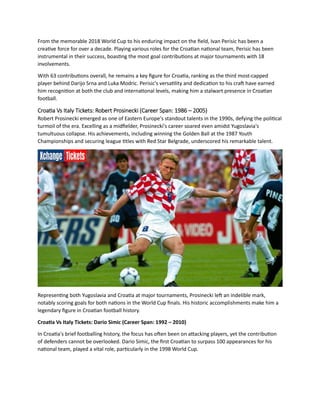“The Enduring Impact of Football on Croatian Society
Related Articles The Enduring Impact of Football on Croatian Society
The Enduring Impact of Football on Croatian Society

Football, or nogomet as it is known in Croatian, is more than just a sport in Croatia; it is a cultural phenomenon deeply interwoven with the nation’s identity, history, and social fabric. From the euphoria of international successes to the grassroots movements nurturing young talent, football’s impact on Croatian society is profound and multifaceted. This article delves into the various ways football has shaped Croatian society, exploring its historical significance, cultural influence, economic contributions, and its role in fostering national unity and identity.
A Historical Overview: Football’s Roots in Croatia
The introduction of football to Croatia dates back to the late 19th century, coinciding with the rise of national consciousness and the desire for cultural expression within the Austro-Hungarian Empire. Students returning from studies abroad, particularly from Vienna and Budapest, brought with them the new sport, leading to the formation of the first football clubs in Zagreb and other major cities. Clubs like HAŠK (Hrvatski Akademski Športski Klub) and Concordia became not only sporting institutions but also centers for Croatian intellectuals and nationalists.
During the Kingdom of Yugoslavia (1918-1941), football continued to grow in popularity, often serving as a symbolic outlet for Croatian national aspirations within a state dominated by Serbian political and cultural influence. The successes of Croatian clubs and players in the Yugoslav league were celebrated as victories for the Croatian people, fostering a sense of collective identity and pride.
The tumultuous years of World War II saw the establishment of the Independent State of Croatia, a Nazi-aligned puppet state. Football was used as a tool for propaganda, with the national team playing friendly matches against other Axis powers. However, this period remains a controversial chapter in Croatian football history, with many Croatians distancing themselves from the regime’s exploitation of the sport.
In the post-war Socialist Federal Republic of Yugoslavia, football continued to thrive, with Croatian clubs like Dinamo Zagreb and Hajduk Split becoming dominant forces in the Yugoslav league. These clubs enjoyed massive support, and their matches were often charged with political undertones, reflecting the simmering tensions between different ethnic groups within Yugoslavia. The "Eternal Derby" between Dinamo Zagreb and Red Star Belgrade, in particular, became a symbol of nationalistic rivalry, foreshadowing the conflicts that would eventually lead to the breakup of Yugoslavia.
Football as a Catalyst for National Identity and Unity
The collapse of Yugoslavia in the early 1990s and the subsequent Croatian War of Independence marked a turning point in the relationship between football and Croatian society. The Croatian national team, formed in 1990, became a powerful symbol of the newly independent nation, representing its aspirations for recognition and sovereignty on the international stage.
The team’s participation in international tournaments, particularly the 1998 FIFA World Cup in France, played a crucial role in fostering national unity and pride. The "Vatreni" (the Blazers), as the team is affectionately known, captivated the nation with their spirited performances, culminating in a historic third-place finish. Players like Davor Šuker, Zvonimir Boban, and Robert Prosinečki became national heroes, embodying the resilience and determination of the Croatian people.
The success of the national team during this period transcended the realm of sports, providing a much-needed source of hope and inspiration during a time of immense hardship and uncertainty. Football became a unifying force, bringing together Croatians from all walks of life, regardless of their political or social backgrounds. The checkered red and white pattern of the Croatian flag, prominently displayed by fans at matches, became a symbol of national identity and pride.
The Cultural Significance of Football in Croatia
Football is deeply ingrained in Croatian popular culture, influencing everything from music and art to language and fashion. Songs dedicated to the national team and its players are common, and football-related themes often appear in literature and film. The names of famous footballers are frequently used as nicknames for children, and discussions about football dominate conversations in cafes, bars, and workplaces.
The intense passion for football is reflected in the vibrant fan culture that surrounds the sport in Croatia. Supporters’ groups, known as torcide or ultrasi, are fiercely loyal to their clubs, creating an electric atmosphere at matches with their chanting, banners, and pyrotechnics. These groups often play a significant role in their local communities, organizing charitable events and advocating for social causes.
However, the passion for football can also lead to negative consequences, such as hooliganism and violence. Clashes between rival fan groups are not uncommon, and incidents of racism and discrimination have been reported at some matches. These issues pose a challenge to Croatian football authorities, who are working to promote a more inclusive and respectful environment within the sport.
The Economic Impact of Football in Croatia

Football is a significant contributor to the Croatian economy, generating revenue through ticket sales, merchandise, sponsorships, and media rights. The Croatian Football Federation (HNS) invests in the development of football infrastructure, including stadiums, training facilities, and youth academies. These investments not only improve the quality of football in the country but also create jobs and stimulate economic growth.
The success of Croatian players in foreign leagues also has a positive impact on the Croatian economy. Remittances from these players contribute to the national income, and their achievements abroad enhance Croatia’s international reputation. The transfer of players to foreign clubs generates significant revenue for Croatian clubs, which can be reinvested in player development and infrastructure improvements.
However, Croatian football also faces economic challenges, including financial instability among some clubs, corruption allegations, and a lack of transparency in financial dealings. These issues undermine the credibility of the sport and hinder its potential for further growth. Efforts are being made to address these challenges through stricter regulations, improved governance, and increased transparency.
Football as a Social Force: Community Engagement and Youth Development
Beyond its economic contributions, football plays a vital role in Croatian society as a vehicle for community engagement and youth development. Football clubs often serve as important social hubs in their local communities, providing opportunities for people of all ages to come together and participate in sporting activities.
Youth academies and football schools play a crucial role in nurturing young talent, providing children with access to professional coaching and training facilities. These programs not only develop future footballers but also instill important values such as teamwork, discipline, and respect. Football can also serve as a positive influence on young people, encouraging them to stay in school, avoid drugs and alcohol, and lead healthy lifestyles.
Football-related initiatives are often used to promote social inclusion and address social issues. Programs targeting disadvantaged youth, refugees, and people with disabilities use football as a tool for empowerment and integration. These initiatives demonstrate the potential of football to make a positive difference in the lives of individuals and communities.
Challenges and Future Prospects
Despite its many positive contributions, Croatian football faces several challenges that need to be addressed to ensure its continued success and relevance. These challenges include:
- Hooliganism and Violence: Addressing the issue of hooliganism requires a multi-faceted approach involving stricter policing, improved stadium security, and educational programs aimed at promoting responsible fan behavior.
- Corruption and Lack of Transparency: Strengthening governance structures, implementing stricter financial regulations, and promoting transparency in financial dealings are essential for restoring trust in Croatian football.
- Infrastructure Deficiencies: Investing in modern stadiums and training facilities is crucial for improving the quality of football in the country and attracting international events.
- Brain Drain: Retaining talented young players in Croatia requires creating a more attractive professional environment, with better salaries, opportunities for advancement, and a stronger league.
Looking ahead, the future of Croatian football appears bright, with a new generation of talented players emerging from youth academies and making their mark on the international stage. The success of the national team in recent years, including reaching the final of the 2018 FIFA World Cup and finishing third in the 2022 FIFA World Cup, has reignited national passion for the sport and inspired a new wave of young players.
Conclusion
Football’s impact on Croatian society is undeniable. From its historical roots as a symbol of national identity to its current role as a cultural phenomenon and economic driver, football has shaped the nation in profound ways. While challenges remain, the passion and dedication of Croatian fans, players, and administrators suggest that football will continue to play a central role in Croatian society for generations to come. By addressing the challenges and building on its strengths, Croatian football can continue to inspire, unite, and contribute to the well-being of the nation.

